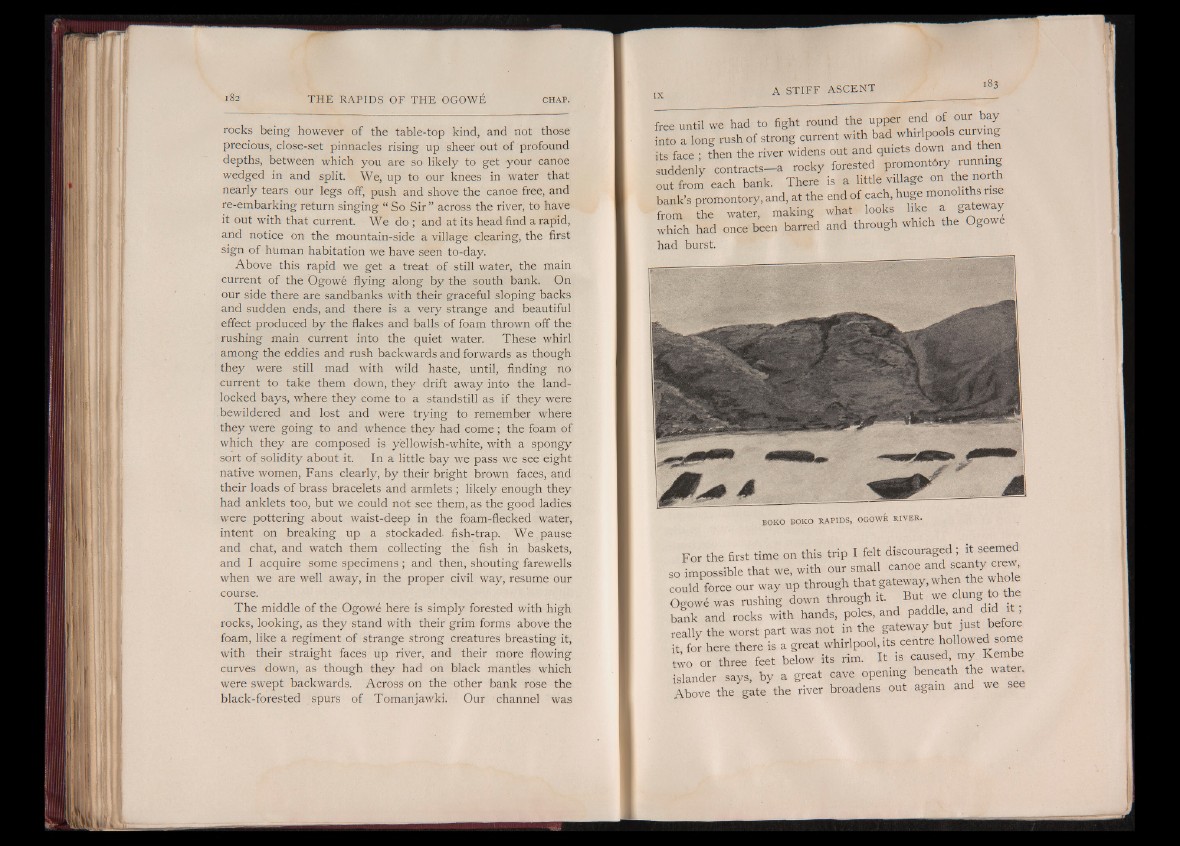
rocks being however of the table-top kind, and not those
precious, close-set pinnacles rising up sheer out of profound
depths, between which you are so likely to get your canoe
wedged in and split. We, up to our knees in water that
nearly tears our legs off, push and shove the canoe free, and
re-embarking return singing “ So Sir ” across the river, to have
it out with that current. We do ; and at its head find a rapid,
and notice on the mountain-side a village clearing, the first
sign of human habitation we have seen to-day.
Above this rapid we get a treat of still water, the main
current of the Ogowe flying along by the south bank. On
our side there are sandbanks with their graceful sloping backs
and sudden ends, and there is a very strange and beautiful
effect produced by the flakes and balls of foam thrown off the
rushing main current into the quiet water. These whirl
among the eddies and rush backwards and forwards as though
they were still mad with wild haste, until, finding no
current to take them down, they drift away into the landlocked
bays, where they come to a standstill as if they were
bewildered and lost and were trying to remember where
they were going to and whence they had come ; the foam of
which they are composed is yellowish-white, with a spongy
sort of solidity about it. In a little bay we pass we see eight
native women, Fans clearly, by their bright brown faces, and
their loads of brass bracelets and armlets ; likely enough they
had anklets too, but we could not see them, as the good ladies
were pottering about waist-deep in the foam-flecked water,
intent on breaking up a stockaded fish-trap. We. pause
and chat, and watch them collecting the fish in baskets,
and I acquire some specimens; and then, shouting farewells
when we are well away, in the proper civil way, resume our
course.
The middle of the Ogowe here is simply forested with high
rocks, looking, as they stand with their grim forms above the
foam, like a regiment of strange strong creatures breasting it,
with their straight faces up river, and their more flowing
curves down, as though they had on black mantles which
were swept backwards. Across on the other bank rose the
black-forested spurs of Tomanjawki. Our channel was
A STIF F ASCENT
free until we had to fight round the upper end of our b^
into a long rush of strong current with bad whirlpools curv g
its face ; then the river widens out and quiets down and then
suddenly contracts-a rocky forested
out from each bank. There is a little village on thenorth
bank’s promontory, and, at the end of each, huge mono1^ ” ^
from the water, making what looks like a g ^
which had once been barred and through which the Og
had burst.
B O K O B O K O R A P I D S , O G O W E R I V E R .
For the first time on this trip I felt discouraged ; it seemed
so impossible that we, with our small canoe and scanty crew,
could force our way up through that gateway, when the whole
Ogow£ was rushing down through it. But we clung; o
bank and rocks with hands, poles, and p ad d l e an d d id i t ,
really the worst part was not in the gateway but just before
it, for here there is a great whirlpool, its centre hoUowedsome
two or three feet below its rim. is caused, my Ke
islander says, by a great cave opening enea e '
Above the gate the river broadens out again and we se